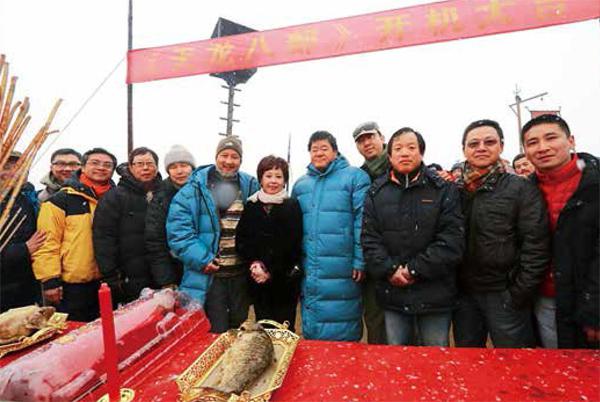我要让最优秀的“华流”出海
2018-12-13陈抗
陈抗
杭州西溪创意产业园内绿树如荫,分外安静。疏影横斜之间,坐落着栋栋小楼,华策影视就隐藏在这里。看起来并不显山露水,但从这幢办公楼却每年输出千集精品电视剧,成为“流量担当”。
在我面前的赵依芳,因为感冒,喉咙有些嘶哑,神色也略显疲惫,但是很快她就打开了话匣子。
“人一生就三万多天,每个人过得都不一样,一定要找到自己的人生坐标才有动力。”摸爬滚打多年,作为华策影视创始人,赵依芳有了诸如“电视剧女王”“爆款专业户”多个称号,但她的初心始终是做自己想做的事情。
人生的三个关键节点
在赵依芳看来,他们这一代人很渺小,却很幸运,因为他们踩中了极其重要的时间节点。
赵依芳回忆,自己有三个关键的时间节点:第一个关键节点是1978年,那一年,她成为了恢复高考后浙江传媒学院新闻系的第一届毕业生。“能够来到省城读书很幸运,当时我唯一的憧憬就是毕业后能找个‘铁饭碗。在大学里,我看到了中共十一届三中全会的公报,公报里描绘了国家改革开放的前景,提出要以经济建设为中心,让老百姓过上好生活。当时我觉得特别新鲜,好像懵了很久突然醒了,以前的认知都被颠覆了。我开始去思考自己想要做些什么。”
赵依芳的第二个关键节点,是她进入机关单位——东阳广电局工作。改革开放之后,整个国家的机关体系缺乏人才,尤其是年轻人才,所以她那一届毕业的四个年轻人得到了特别的培养和关注。在机关单位工作的12年,赵依芳得到了人生最重要的锻炼和成长,也学习到了国家各行各业的政策规范要求,学会以国家的宏观发展目标去看待问题。
那12年里,每年赵依芳都要下基层,到各个乡、镇、村去。在一次参与东阳的抗洪工作中,她三天三夜都没有睡觉。“在基层锻炼的过程中,我明确了自己人生的目标和方向,想着应该为这个社会做点事情,创业的理念和价值观体系也逐渐有了苗头。”赵依芳说。
赵依芳人生中第三个关键节点,是1992辞职“下海”。放弃“铁饭碗”是很难的事情,她足足考虑了一年多的时间。“我还有好多想做的事情没做啊,现在国家给了这么好的政策,我要去试试。所以我下定决心辞职。”
文化产业的改革开放之门
辞职之后,赵依芳来到杭州,在莫干山路上一家小宾馆里租了两个标准间,团队只有五个人,白天出去跑业务,晚上回来做文案。
当时最大的考验是在心理上,有求于人、重新起步,其中的心理落差必须一步到位地调整好。选择参与电视剧制作后,赵依芳出品的第一部作品是电视剧《子夜》,在很多电视台播出后得到了很好的反响,这给了她很大的成就感。
2003年文化体制改革后,赵依芳在浙江深切地体会到文化产业的改革开放之门打开了,民营影视行业开始有了发展机遇。“浙江省对于民营影视企业,从允许到鼓励、支持、表扬、激励,给我们创造了一个宽松的发展环境,”赵依芳说,“而且,我们不再只停留在命题作文式的题材里,开始思考去拍更多与市场接轨、满足观众需求的作品。”
2005年10月25日,赵依芳成立了华策影视,希望能够真正把电视剧的制作和营销变成一个有长期发展逻辑的事情,打造一个面向未来的企业。
2005~2010年,是影视文化产业大转型的时期。2009年,华策影视变更为股份制有限公司,2010年上市,成为创业板的“电视剧第一股”。华策成功上市后很长一段时间,还有不少同行不敢相信:“你们真的上市了?”
但是,上市之后,赵依芳一下子困惑了。本来做好内容就行了,进入资本市场后,要开始考虑利润成长性、业务可持续性、企业的战略规划等等复杂的东西,考虑范畴变成了上亿级别的投资。上市初期,赵依芳的思路很不清晰,不知道是要做赚钱的公司还是做有内容的公司,怎样去平衡自己的愿景和上市公司的成长。
她思考了很久。有一天,她突然想明白了:“这个公司只要是我开的,就要专注做内容。”华策能有今天的成绩,就因为对内容的坚守,围绕内容去构建实力、做大产业、整合优质资源。
现在华策的定位很清楚:内容为王、产业为基、华流出海,打造中国影视文化“金名片”。
赵依芳开玩笑说,在华策,想做一部不成功的电视剧挺难。华策已经形成了自己的一套精品剧“质造”方法论,建立了完整的数字化工业体系,“优生优育”。“优生”就是从研发题材开始严把关,标准是五性:思想性、艺术性、观赏性、政治性、市场性;“优育”靠的是赋能体系:华策建立了大数据研发中心、创意中心、评估中心、营销中心、制作管理中心等一整套综合体系,300多人的团队从立项开始层层打分,从几百个项目中挑选,在制作过程中及时调整,充分了解观众审美,精准把控流程。
打造价值精品,力推“华流”出海
在赵依芳的理解中,传媒的本质是传播,核心是去抓取时代的主流价值体系,这是文化的价值、国家的灵魂。
40年改革开放,极大丰富了老百姓的文化娱乐生活。文化产业经历了从无到有、从有到逐步壮大的过程。题材和渠道多元化,从无屏时代到有屏时代再到多屏时代,现在又到了无屏时代,因为屏幕无处不在,随时随地触发用户需求。影视文化的内容形态,从“几乎没有”发展到现在的“非常丰富”。
在互联网时代,内容在互联网上的传播影响很大。利用互联网工具,华策已经打造出互联网时代“文化+产业”新生态,新媒体运营、影视教育、文化旅游、广告植入、IP运营等领域都有涉及,扩大了优质内容的“乘数效应”。
在趙依芳心里,一直有个“华流出海”的梦想,她希望中国文化能够输出到全球各地。华策的海外营销方式是坚持在全世界“摆摊”,用市场化手段“走出去”,在内容、剧场、资本方面互鉴互利、共享共荣。事实证明,只要是有温度的、彰显中国文化的内容,都能够打动海外观众。
在影視“出海”方面,华策已经成功将1万多小时的影视剧行销到全球180多个国家和地区,在影视出海领域的市占率达到近20%。华策还在全球多地设立分部,华策大家庭已经达到了1000多人。
“文化产业领域需要有改革开放的意识,”赵依芳说,“中国文化想要繁荣兴盛,就要和世界各国文化相交、相融、相通,让中国的文化成为世界的一个部分。”现在,浙江已经成立了浙江影视产业国际合作区,中国民营企业以后可以“抱团出海”,在政府支持下,共同寻找一个市场化的出口,推动影视产业的升级。
Zhao Yifang: Huace Film & TV Aims High
By Chen Kang
Huace Film & TV, a public company listed on the Shenzhen Stock Exchange, is headquartered in a creative industrial park near a wetland in Hangzhou, capital of Zhejiang province in eastern China. The villa-like office in the scenic park doesnt look awesome, but Huace is a giant producer of television dramas, making more than 1,000 episodes of television dramas a year.
Zhao Yifang is the media groups president. “A human life is about 30,000 days and nights long and no ones life is the same. For me, I feel motivated when I have objectives,” said Zhao Yifang in a press interview.
In her eyes, the three turning points in her life have synchronized well with the nations fast and ambitious advancing toward modernization. The first turning point of her life occurred in 1978, a year when China officially launched the great reform and opening up to the outside world. She studied journalism at Zhejiang Radio and Television School, a two-year junior college which has evolved into present-day Communication University of Zhejiang. In the two years, she witnessed unprecedented changes across China as the whole nation began to break away from stereotyped thinking. Before she came to college, she dreamed that the college education would give her a lifelong good job. In college, she woke up to the new possibilities opened up by the modernization drive. She began to wonder what she could do in the future.
After graduation, she was assigned to work at Radio and TV administration of Dongyang in central Zhejiang. Back then, the government badly needed young talents. She and three other college graduates were given special training and work opportunities at the administration. The twelve years she spent at the administration were her formative years, helping her to understand the national situation and individual dreams, and to form her values and give her a dream of starting her own business.
The third turning point of her life occurred in 1992 when she quit the good job at the administration and started her own business. She had hesitated for a year, weighing possible losses and gains. Eventually she made up her mind.
She quit the job and came to Hangzhou. She rented two rooms in a small hotel as offices. Altogether there were five of them starting a small media business. They went out to do business during daytime and spent evenings at hotel rooms writing plans. Her first television production was , a 14-episode drama based on a 1932 classical novel by Mao Dun. The series was screened by many television studios and the initial success gave her a sense of pride.
The year 2003 witnessed the restructuring of the nations showbiz system. Zhao felt a door opened. Preferential policies issued by the government made it possible for private media groups to make big in the industry.
On October 25, 2005, she founded Huace Film & TV, hoping to see a long-term logical growth in the production and marketing of television dramas. The company boomed. In 2010 it was listed at Shenzhen Stock Exchange. After it turned public, many fellow showbiz people still couldnt believe the company was listed.
Zhao hesitated about what she should do for a while after the public listing: should Huace focus on the financial side of the business or should Huace dedicate to content-making? Then she knew what to do: as long as Huace was hers, it would do nothing but content making.
Nowadays, Huace is Chinas leading producer of television dramas. With a solid and sound production system, Zhao joked that it would be very difficult for Huace to make a bad television drama. About 300 experts work together to make sure a television drama will be a winner.
Zhao understands that the nature of media is communication and a successful communication hinges on the mainstream value. The value is the core of culture and the soul of a nation.
Zhao has long dreamed of exporting Chinese television dramas to overseas market. Huace has sold television dramas to over 180 countries and regions across the world, which amounts to more than 10,000 hours, accounting for nearly 20% of Chinas content export. Huace has many overseas offices and has more than 1,000 employees.
